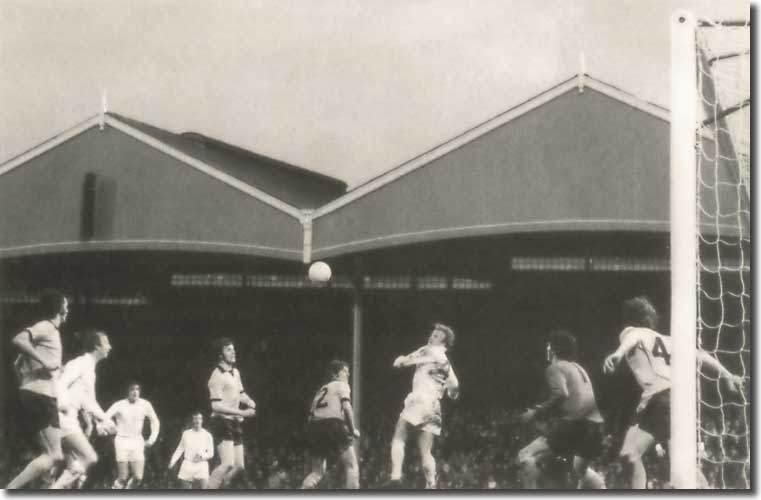 |
 |
 |
 |
 |
 |
 |
 |
 |
First Division - Molineux - 53,379
Scorers: Bremner
Wolverhampton Wanderers: Parkes, Shaw, Taylor, Hegan, Munro, McAlle, McCalliog, Hibbitt, Richards, Dougan, Wagstaffe
Leeds United: Harvey, Reaney, Madeley, Bremner, Charlton, Hunter, Lorimer, Clarke (Yorath), Bates, Giles, E Gray
If Leeds lost, a Liverpool victory would see them win the title. Table-topping
Derby County would be champions if the Reds failed to win. United's mood had been boosted by their victory
in the FA Cup final against Arsenal two days earlier; on the other
hand they had been denied the chance of rest and recuperation, travelling
by coach to the Mount Hotel in Wolverhampton immediately following the
final, without even attending the post-match banquet. There were some who would have preferred to celebrate, Norman Hunter
for one: 'What the Gaffer should have done is let us go out and get absolutely
smashed. We'd have gone in the stream room on Sunday and been fine by
Monday.' Describing the match as 'the most important we have faced since our return
to the First Division', Don Revie
promised that United would not go into the game with a defensive mindset.
'Leeds United must go all out for victory ... This might appear illogical
since we need only a draw to finish ahead of Derby County and Liverpool,
but I reckon it would be soccer suicide to adopt a defensive style of
play. Attack really is the best form of defence against Bill McGarry's
team, because they possess the ability to swamp opponents like a tidal
wave. 'It is vital to stop Wolves defenders and midfield players from supporting
the likes of Derek Dougan, John Richards and David Wagstaffe up front.
The best way to do that is to keep them under pressure. Wolves prefer
opponents to play defensively, because it means that their own flaws at
the back are not exposed. 'Although Wolves have only an academic interest in the championship,
and are in the middle of a two leg UEFA Cup final with Tottenham, this
will not make our task any easier. Teams can always be relied upon to
raise their game against us and this should be particularly true in Wolves'
case, considering the tremendous atmosphere that can be expected at Molineux
on Monday. 'I can't recall a team being forced to play a championship decider so
soon after appearing in a Revie had tried everything he knew to get the game delayed, but had fallen
foul, as he had on so many other occasions, of irascible Football
League secretary Alan Hardaker. After United's place in the FA Cup final was secured, the League determined
that they would have to play Chelsea on 1 May, the Monday before the final,
and their game at Wolves would be a week later, two days after Wembley.
In addition, with England facing West Germany in the European Championship
on 29 April and 13 May, United's England players would bear additional
burdens. The club appealed for the fixtures to be delayed until the middle of
May, but there were a number of issues with this, not the least of which
was the circumstances of the clubs they faced. Chelsea were unwilling
to co-operate because they had arranged to leave on a tour of the Caribbean
on May 13, while Wolves were scheduled to play Spurs in the UEFA Cup final
on 3 and 17 May. Hardaker obstinately dismissed all requests for deferral, opining, 'I
have not seen one suggestion of a better solution to the problem. If Leeds
United wish to play Wolves on 9 May they are quite free to do so as far
as the League are concerned, but they will have to play without their
England players unless the FA agreed to release them. 'Similarly, if Wolves will agree to play Leeds on 19 May, two days after
the UEFA Cup final and the FA would release their international players,
the League would not object. Nor would the League object if Leeds suggested
dates in order to play without their England players. 'It seems to me that for years the press have been saying that country
must come before club, and yet when it comes to criticising the League
for a decision that had to be made, the England v West Germany matches
have been very carefully overlooked.' Eric Todd commented on the situation in The Guardian, 'For the
second time in two years the Fates, with whom may be associated the Football
League, are making it very hard for Leeds United to win anything. Only
in Yorkshire, perhaps, would this be classified as victimisation; outside
it, even those people who hate Leeds as they used to hate Arsenal, Tottenham
Hotspur and Manchester United - envy is too modest a word - must feel
that little effort has been made either to sympathise with Leeds or to
try to accommodate them on their final run-in for the Double. 'Sympathy can find little room in football these days but sooner or later
the League and the Football Association must realise that the football
season is far too long and far too congested with a multitude of competitions.
There is no space 'It is as monstrous as it is unfair that Leeds or any other club placed
similarly should have to play a game a few days before the FA Challenge
Cup final and another one two days after it. 'If Leeds fail to win either the Cup or the league title they need not
blame loss of form. They must blame the system. And if Leeds cannot field
a full strength side against Arsenal at Wembley, the crowd and the FA
can blame the Football League and Chelsea who have decided that their
jaunt to the West Indies, or wherever it is, is more important than trying
to help Leeds prepare properly for their crucial matches. Fair enough.
Why should they anyway? 'Not that I am concerned over much with Chelsea or with the European
Championship. I am more concerned only that any side, Leeds, Chelsea,
Hartlepool or Watford, who have a chance of winning one or both of the
major competitions this country has to offer is given a reasonable chance
of winning them. In this instance Leeds have not been given that chance. 'But Leeds in recent years have been nobody's friends. The authorities
closed Elland Road last year after a few yobbos had run on to the pitch
regardless of the fact that this sort of thing happens every week on most
grounds. Two years ago between the first of their three semi finals against
Manchester United and the final, Leeds had to play ten games in three
weeks and were beaten by Chelsea in a final replay
and they finished as runners-up in the league. 'I believe that Leeds have been treated scandalously and are having to
pay the penalty for lack of foresight by the League and the FA.' In the eventuality, United beat Chelsea 2-0 and did so quite convincingly,
following up with an impressive if narrow defeat of Arsenal at Wembley,
but those games left their resources badly depleted. Already without Terry Cooper, missing with a broken leg, United were
also missing hard working centre-forward Mick Jones, who had dislocated
his elbow in the closing seconds of the final, while several other players
were carrying injuries. Allan Clarke and Johnny Giles had painkilling
injections before the Molineux game, and Eddie Gray and Clarke both played
with heavy strapping. All three had treatment in nearby West Bromwich
Albion on Sunday. Jones' place was taken by Wembley substitute Mick Bates,
playing in midfield with Billy Bremner operating up front, and Terry Yorath
was on the bench. It was a night of the highest tension, excitement and passion with a
crowd of more than 50,000 packed behind gates that were closed long before
kick off time. During the match, more than 70 people suffered injuries
when crush barriers gave way. United began as if they were determined there would be no slip up, proving
true to Revie's promise of all out attack. Geoffrey Green in The Times:
'Almost from the start it seemed that Leeds had decided that to slacken
the pace was to lag behind and those who lag behind are beaten.' Nevertheless, they had a moment of anxiety after five minutes when goalkeeper
David Harvey came out to collect a Wolves free kick. Wanderers' veteran
striker, Derek Dougan, got to the ball first and headed down to John Richards,
who shot powerfully from eight yards out. Paul Madeley blocked it and
then cleared the danger. But then Bremner had the first opening for United when Frank Munro slipped
as he tried to clear; the Leeds captain also fell victim to the greasy
surface as he attempted a spectacular overhead kick. Soon afterwards Wolves keeper Phil Parkes collided with Allan Clarke
in the area and the visitors' appeals for a penalty seemed fully merited.
They were even more emphatic in the 25th minute as Leeds continued to
press. After Bremner's shot was blocked, the ball ran to Clarke on the
edge of the area; the England striker lobbed it back in and home defender
Bernard Shaw seemed to get both hands to the ball to prevent the goal.
Referee Bill Gow was unsighted with Shaw facing away from him, but linesman
J C Collins of Macclesfield gave him no assistance regarding the decision.
'It was one of his first games and he froze,' said Norman Hunter. The referee commented after the game: 'I did not see anything, and the
linesman did not signal for anything. I could not award a penalty for
something I just did not see. It is as simple as that ... It is the easiest
thing in the world to give a penalty if you listen to the crowd and the
players. But you cannot give a decision on something you do not see.' While Gow was returning to his home in Swansea, his wife Gladys was watching
the highlights of the game on television and when he arrived at his house
at 2am she greeted him with the words, 'It looked a penalty on the box,'
much to his delight! In the few minutes following the penalty appeal, Gray put Giles in possession
of the ball and the Irishman gave Lorimer the opportunity to get in a
powerful left-footed drive, only for Parkes to save via a full length
dive. United continued to press Wolves back into their own half, but they were
in despair in the 43rd minute. Madeley was forced to concede a corner,
Wolves' second of the night, while Leeds had managed seven. Winger Dave
Wagstaffe took it Nevertheless, Don Revie worked his restorative magic during his half
time team talk and his men were immediately back on the offensive once
the second period commenced. The pressure led to Jim McCalliog conceding
a free kick and the Scottish midfielder was booked when he felled the
heavily limping Allan Clarke as he sought to insinuate his way into Wolves'
defensive wall. When Lorimer was finally able to take the free kick, he hammered it from
30 yards, threatening to pierce the packed defence. Wolves somehow managed
to scramble the ball away, though there was suspicion of another handball
by Shaw. The defender was cautioned soon afterwards. United were now on perpetual attack, and goalkeeper Harvey had to make
two excellent saves as they left gaps at their rear. But Leeds several
times came close to an equaliser with strikes in quick succession from
Giles, Clarke and Clarke again all being saved by a diving Parkes. Clarke
was booked for dissent during this period of pressure. After 67 minutes, just as United's momentum approached its zenith, Wolves
doubled their lead. Hegan and Richards led a quick break out and the latter's
cross from the right was smartly despatched by Dougan, skilfully flicking
it past the advancing Harvey. The die was cast, and Don Revie was forced into a last desperate move.
He withdrew the struggling Clarke, summoned Yorath from the bench and
pushed Bremner and Charlton forward. He must have regretted not making
the call earlier in the evening as the decision paid instant dividends.
Giles swung an immaculate pass out to the left, Madeley played it into
the very heart of the Wolves area to give Bremner an opportunity. He needed
no second bidding, smashing it emphatically into the roof of the net,
screaming in triumph as he did so. Gerry Taylor and Hegan were booked for Wolves and then Madeley had to
clear a Wagstaffe shot off the goal line as United abandoned any pretence
of defence. Then Richards lobbed the ball onto Harvey's bar from 15 yards.
Undeterred, United pressed anxiously for the equaliser that could yet
give them the championship. They nearly got it at the death: Charlton lobbed the ball into the centre.
Yorath nodded it over the head of goalkeeper Parkes from six yards, but
couldn't get a meaningful touch on the ball. He claimed later that if
he had managed to actually head the ball he would have buried it but it
only flicked his hair. Up popped Taylor to head the ball off the line
as time seemed to stand still. The Leeds challenge was over. Geoffrey Green in The Times: 'The excitement reached fever pitch
as one side and then the next 'It was all rather chaotic for Wolverhampton: Dougan, Wagstaffe and in
the last analysis Parkes made the absolute decisions. But Giles, in spite
of being below full fitness, and Bremner kept popping up everywhere. Bremner,
whether up front or in midfield, as always was the surreptitious master.
But Leeds could not quite do it though they almost with the last breath
yanked themselves out of darkness into history.' Jack Charlton, celebrating his
37th birthday, summed matters up perfectly when he said afterwards, 'I
am sick as a pig - it's as simple as that.' When the players boarded their coach for a forlorn journey home to Leeds,
Don Revie told them: 'You have had a great season. The FA Cup is ours
and we are second in the league. Come on, enjoy yourselves ... I am proud
of you. You will not go far wrong if you work like you did tonight. Where
you found the stamina for that second half, I will never know.' In his next weekend column for the Yorkshire Evening Post, Revie
passed on his congratulations to Derby, but went on, 'Deep down, I cannot
accept they deserved to snatch the title from Leeds United's grasp. 'I wrote months ago that Derby were a good bet for a major honour this
season. They are one of the most exciting young sides to emerge in the
English soccer game in years and I have no doubt they will prove worthy
English representatives in next season's European Cup. But it would be
hypocritical for me to say that Derby won the gripping championship race
because they were the best side. It was more a case of Leeds failing to
get the breaks needed when chasing the elusive Double. 'We have done remarkably well to finish second in the table in view of
the setbacks experienced during the last eight months. The worst blow,
of course, was the League's decision to force us to play our last league
fixture against Wolves just two days after appearing in the FA Cup final. 'Although we needed only a point at Molineux to clinch the title, my
players had precious little time to recover from any knocks and more important
get the tension of Wembley out of their systems. I was proud of the way
they raised their game against Wolves.' Eric Todd in The Guardian: 'This surely will go down as one of
the bravest failures of all time. Indeed, I hesitate to call it a failure
at all. 'To what extent Leeds were affected by the mental and physical strain
and euphoria of Saturday's FA Cup final may not be calculated. Nor shall
we ever know whether Leeds would have earned the crucial point if Jones
had been available. But in spite of all Fortune's mocking ... Leeds simply
would not give in. As if to cock a snook at authority, which demanded
that they should play a League game during Cup final week and another
game two days after Wembley, Leeds were at their considerable best. And
if Bremner has played a more inspired or inspiring game I wish I had seen
it. He led the forward line as though he had been there all his playing
life, and young Bates, who took over from Jones, could not be faulted
in anything he did. But of course he is not a Jones on the ground or in
the air. 'With Jones absent and Clarke not fully fit, even when the game started,
Leeds could have been forgiven for aiming only for a draw. A draw, with
Bremner directing operations? It was not to be contemplated. He drove
his men as they never have been driven before and every single one of
them responded magnificently. 'To the last, Leeds strove and suffered, and with nearly everyone except
Harvey in the Wolverhampton goalmouth it seemed that the equaliser must
come. But also to the last the gods refused to have a change of heart
and Leeds were left alone with their glory and the Cup. Nevertheless,
I am convinced that they will achieve the Double one day. They are far
too good a side to be frustrated forever. 'There was no reason at all for Wolverhampton to be co-operative or compassionate
and certainly they were neither. It was not up to them to contribute to
another notable chapter in football history. Their chief concern was to
placate their supporters, who have had little enough over which to enthuse
in recent times. So it was that they rose to the occasion splendidly.
Although, like Leeds, they found the conditions against really good football,
they swung the ball about and Hibbitt, above all, brought the best out
of Charlton and his colleagues.' It was not only the United players who had cause to bemoan the vagaries
of refereeing decisions that night. Liverpool had to settle for a goalless
draw at Highbury against Arsenal and Bill Shankly was enraged when Roger
Kirkpatrick ruled out an 88th minute goal by John Toshack for offside.
'That man has denied us the First Division championship,' Shankly said.
'When Keegan mishit his shot, Toshack was nowhere to be seen, he only
arrived on the scene at the last moment. It was a diabolical decision.
This same referee denies us a goal in the League against Leeds. On that
occasion he didn't take notice of a linesman, yet this time he did.' The two results left Brian Clough's Derby County as shock champions,
and their players learned the news while on a summer break with assistant
manager Peter Taylor in Majorca. Clough was with his family in the Scilly
Isles and revealed that 'Taylor convinced them the title was ours, but
I can't honestly say I shared his confidence. I expected Leeds to get
the result because Revie was the most thorough of men who, wherever possible,
left nothing to chance.' Clough went on, 'It is incredible. I do not believe in miracles, but
one has occurred tonight. I believe they played four and a half minutes
of injury-time at Molineux - if seemed like four and a half years to me.
There is nothing I can say to sum up my feelings adequately.' Derby County finished with 58 points, Leeds (second), Liverpool (third)
and Manchester City The Wolves-Leeds game would in later years assume enormous significance
in the history of the club and Don Revie, and for reasons other than the
result and the performance. Stuart Sprake and Tim Johnson in Careless Hands: The Forgotten Truth
of Gary Sprake: 'The day before the match ... the Sunday People revealed
that an attempt had been made to fix the game, with offers made to Wolves'
players to throw the match. An inquiry was held but was to prove inconclusive
as no evidence was found after a shroud of secrecy descended and no-one
could identify Revie's agent or middle man. 'Five years later, during Richard Stott's investigation, the identity
of the middle man was revealed. It was Mike
O'Grady, the former Leeds winger, who was on Wolves' books at the
time ... The investigating team confronted O'Grady, who admitted to being
the go between. When questioned about the incident he replied: "It
was me. No one else was involved, just Revie and me. It was a one-to-one
situation and I just did as I was asked and made an approach. I never
received any money so I am not implicated, I never received a penny. It
was suggested I go and see what the reaction would be, which I did but
the Wolves player I spoke to said it was a no go." 'According to the Mirror the player approached was Bernard Shaw,
who promptly informed his manager, Bill McGarry. He in turn gathered the
players together to warn them of the money that was perceived to be flying
around and to be careful. The Mirror further alleges that during
the match many appeals were made by Leeds' players to their opposite numbers
to take it easy and to give away penalties. The winger Dave Wagstaffe
was having an inspired game and cries from the touchline urged him to
"Take it easy, we'll see you right." At the heart of the Wolves
defence centre-half Frank Munro was urged to concede a deliberate penalty.
Four months after the game both Wagstaffe and Munro admitted to the Sunday
People that attempts had been made to fix the game, although they
both declined. Munro confirmed that he had two offers of large sums of
money, one before and one during the game if he would give away a penalty.
"I am not saying how much was offered but it was a lot." 'This is an accusation Munro repeats in more forthcoming terms in the
more recent book Running With Wolves, alleging that Billy Bremner,
acting upon Revie's behalf, had twice offered him £5,000 to give away
a penalty. He claims it was not just a spur of the moment decision on
the pitch but a premeditated act before the game as well. 'I got a call
on the Sunday from the Mount Hotel. That was when he first made the offer.
He said I am to give away a penalty and I get five grand. I was tempted;
five grand in 1972 would just about buy you a house. From what I understand
I believe it had gone on for years. Don Readies they used to call him.
I'm sure that's why he finished up so unpopular in the game." 'Gary [Sprake] states: "Revie's alleged attempts at fixing matches
were doomed to fail. Nearly every team that was approached was in mid-table
security and had nothing to play for. Once the approaches were made and
the teams became aware they raised their game and had a burning desire
to put one over us. The boss should have believed more in our ability,
we could have won most games we played without any outside influence...
Perhaps somebody at Derby, with or without Clough's knowledge, offered
more than Revie, or perhaps the Wolves players were motivated to disprove
the rumours they had been tapped up? What is certain is that the controversy
did Leeds no favours as Wolves were really up for the game and especially
Munro, who scored one of the crucial goals for Wolves." 'Many of those who had knowledge of what went on were players still involved
in the game, who were loath to sacrifice their careers by admitting the
truth to the investigators. For Stott and his team the star witness was
going to be Gary Sprake, who had first hand experience of what went on
behind the Elland Road scenes. Having gotten wind of the impending revelations
Revie summoned his most trusted lieutenant, the Leeds captain Billy Bremner,
to contact Gary. He was somewhat taken aback by Bremner's offer of a testimonial,
which was conditional on him not co-operating with the tabloid press.
Gary was particularly surprised to hear from Bremner as he had had little
contact with any of his former team mates since he left for Birmingham
City two years earlier. As Gary says: "What really surprised me was
the fact that, with the exception of Paul Reaney, not one of my ex-team
mates visited me when I was recovering from life threatening surgery after
my back operation." 'Despite several further telephone calls made in an attempt to buy Gary's
silence he rejected their advances. Revie himself made one last attempt
to gag him, arranging to meet Gary in what was then the stereotypical
cloak-and-dagger meeting place synonymous with football, the motorway
hotel. If a manager was summoned to be sacked, his successor courted or
an under-the-table offer made to a player, it was always in such an environment.
It is totally unlike today, where brazen would be suitors court players,
managers and directors of football in five star hotels and restaurants
in the full gaze of the paparazzi's prying lenses. 'Despite Revie's desperate final efforts, it was too late. 'Even though Gary was deemed to be a star witness he actually played
a very small role in the investigation, claiming he saw Revie and his
agent trying to influence the one game against Forest and also revealing
that Revie had paid him not to play for Wales. He did not, as Peter Lorimer
claims in his memoirs, write an article for the paper or comment on any
allegations surrounding the controversial Wolves game in 1972. For Gary
Sprake, however, these admissions cost him thirty years of hostility from
some former team mates and some supporters who have been inculcated with
stories of betrayal.' Gary Sprake: 'After Revie got wind of my part in the Mirror investigation
he and Billy phoned on numerous occasions to offer me both a testimonial
and a job with the Admiral Sports Company. They automatically assumed
that I was doing it for the money. If that had been the case I would have
taken them up on their offer. At the time of the investigation ridiculous
claims were made about how much I had been paid. Someone said that I had
received £30,000; others said it was £15,000. They were all a pack of
lies. I actually received £7,500 for it before tax. 'After I left for Birmingham in 1973, he promised me a testimonial in
1975 and we shook hands on it, although there was nothing in writing.
I phoned Revie on many occasions after I left but he never once returned
my calls. He would leave it to others to tell me that it would happen
soon. After the service I had given Leeds I was hurt and thought it terrible
that he went back on his word. if I had taken Revie up on his belated
offer of a testimonial when the Mirror controversy broke out, I
would have got well over £20,000, far more than I received from the Mirror,
so I can state categorically that money was never the issue. 'When the paper later repeated the allegations against Revie and Billy
Bremner, Billy sued the People for what they and Danny Hegan said
about the Wolves game, and I was called to the Old Bailey as a witness.
I think the People had claimed Billy had asked ... Hegan to give
away a penalty and Billy would "see him right". When I turned
up at the court at nine in the morning Danny was already there, but he
was unfit to give evidence. When Billy's lawyer asked if I was aware of
the offer I just said I couldn't remember, so Billy won his case and received
about £100,000. 'Billy was a wonderful player, one of the best in the world in his position
and a Leeds legend. After he won the court case he should have forgotten
about the whole thing. However, I am aware that after that he would criticise
me a lot during after dinner speeches and also in front of Leeds fans,
sullying me both as a player and a person. Both Billy and I knew what
went on, the real truth. The fact that he continued to say these negative
things and tried to influence others' opinions of me reflects worse on
him than it does me. At the end of the day I played a very small part
in the Mirror investigation and if I had not given evidence they
would have run with it anyway. They had more than enough to go on with
all the other witnesses.' As always with such affairs, there are two sides to this particular story;
in the interests of objectivity, these are the facts and findings of the
libel case brought by Billy Bremner against the Sunday People and
Danny Hegan at the High Court in London. The case concluded on 3 February 1982 with Bremner awarded damages of
£100,000 after the jury decided that the People was not justified
in making accusations Bremner told the jury that he gave up his playing career because of terrace
jibes at away matches that he had fixed games. He said his children had
been taunted at school that their father was a fixer, and similar accusations
were made to his wife when she was shopping. Supporting evidence for Bremner's case was given by Johnny Giles, Jack
Charlton, Allan Clarke and Derek Dougan. As a Wolves player and therefore
ostensibly objective, Dougan's evidence was particularly important; he
said he never heard any Leeds player, or anyone else connected with them,
offer bribes. Giles said the allegations were 'ludicrous', while Charlton
branded them 'total nonsense'. Evidence was given on behalf of the defence by Hegan, Frank Munro, Gary
Sprake, another Leeds player, Bill McAdams, and two journalists.
Mr Justice Bristow told the jury that the Sunday People was, in
effect, accusing Bremner of three offences of corruption for each of which
he could, at a criminal trial, be liable to two years' imprisonment. 'You
will no doubt think long and hard before you find Billy Bremner guilty
of corruption,' the judge advised. Bremner's counsel asked for large damages to compensate the Scot for
injury to his reputation and distress caused to him and his family. The jury of seven men and five women retired for two hours before finding
in favour of Billy Bremner. The award of £100,000 was at the time one
of the highest made in the High Court. The publishers, Odhams Newspapers,
and Hegan were ordered to pay the damages plus the costs of the seven-day
hearing, estimated to be more than £60,000. Peter Lorimer: 'If the boss tried to fix anything, we never saw it …
I've never really seen it in the game. There used to be the odd joke if
we were playing a team last game of the season and we needed the points
and they were in mid-table. If you had some of your Scottish pals playing,
you'd say: "Hope you're not going to have a real go today."
You'd say that in general. You'd say: "Hope you're going to take
it easy on us." But if you're talking about us going up to one of
them with a couple of hundred quid to say, "You're not going to have
a go today …" then I've never seen that. But we all used to do it
jokingly. I remember saying to big Franny Munro, who was a pal of mine,
that night: "I hope you're not going to kick us around." That
was just a bit of banter. But if you were trying to put a story together,
people could say they were trying to say Rob Bagchi and Paul Rogerson in The Unforgiven: The Story of Don Revie's
Leeds United: 'As if the loss of the Double that night at Molineux
wasn't enough to leave a sour taste in every Leeds fan's mouth, the whole
sorry episode was exhumed five years later by the Daily Mirror
as the third plank of evidence in their attempt to prove that Don Revie
was corrupt. Adding to the claims of Stokoe and those conveniently anonymous
Newcastle players about the two games at
the end of the 1961/62 season, Mirror reporters Richard Stott
and Frank Palmer alleged that Revie had enlisted Mike O'Grady ... as a
"fixer", paid to offer his new colleagues £1,000 per man to
gift the title-decider to United. The article was based on interviews
undertaken with O'Grady and Gary Sprake ... which appeared to corroborate
the allegations. However, when the case was investigated by the police
and the FA, both parties found that Revie had no case to answer. When
the People, the Mirror's sister paper, repeated the claims,
egging the pudding by alleging that Bremner kept trying to find takers
for the "bribe" in the course of the game, Bremner sued for
libel. At the trial Sprake was forced to retract his version and Bremner
was duly awarded £100,000 damages by the court. As for O'Grady, in 1990
he told Revie's biographer, Andrew Mourant, that he felt pressurised by
the journalists into talking to the Mirror but now refused to substantiate
the paper's story. It's a strange tale, full of claims and counter claims,
but given the court's verdict and the findings of the police and the FA,
it's difficult to see how we're supposed to believe in Revie's guilt.
It just doesn't add up. 'While Bremner emerged as the victor from this tawdry saga, Revie is
still the loser. Mud has continued to stick to him, allowing those who
feuded with him in the 1960s and 70s to exploit the immunity provided
by his death to trot out all manner of wild accusations without needing
a scrap of proof to back them up. Malcolm Allison, for example, interviewed
by Rob Steen in The Mavericks, is allowed to say that Revie "used
to leave £300 or £400 in an envelope in the referees' room and they could
take it or leave it. I'm just talking about a little thing called bribery." 'Over the thirteen years Revie was manager of Leeds and nearly 500 games
in all competitions, wouldn't at least one referee, one might think, have
corroborated Allison's claim? Yet the allegation is left unchallenged.
Revie's death has meant his reputation is fair game for anyone. The lessons
to be learned from all this are simple. Don't walk out on the England
job and sell exclusive rights to your story like Revie did, thereby making
enemies of all the other newspapers, and, above all, don't die early.'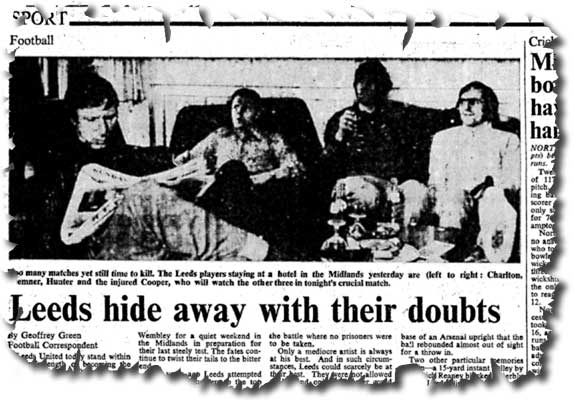 On the evening of Monday, 8 May, 1972, Leeds United faced a date with
destiny: their season climaxed with an outstanding opportunity of becoming
League champions for the second time in three years. The title would be
theirs should they avoid defeat at Molineux against Wolves. Mathematically,
a draw might allow Liverpool to finish above them by virtue of goal average,
but the Merseysiders would require an 11-0 victory against Arsenal at
Highbury, and such results were the stuff of fantasy.
On the evening of Monday, 8 May, 1972, Leeds United faced a date with
destiny: their season climaxed with an outstanding opportunity of becoming
League champions for the second time in three years. The title would be
theirs should they avoid defeat at Molineux against Wolves. Mathematically,
a draw might allow Liverpool to finish above them by virtue of goal average,
but the Merseysiders would require an 11-0 victory against Arsenal at
Highbury, and such results were the stuff of fantasy.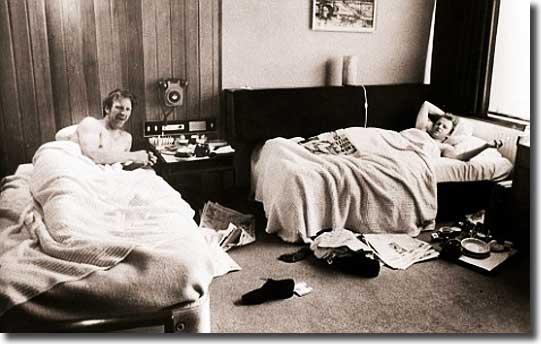 Wembley
Cup final. But I am convinced that there is sufficient character in this
Leeds team to accept the challenge and emerge triumphant.'
Wembley
Cup final. But I am convinced that there is sufficient character in this
Leeds team to accept the challenge and emerge triumphant.'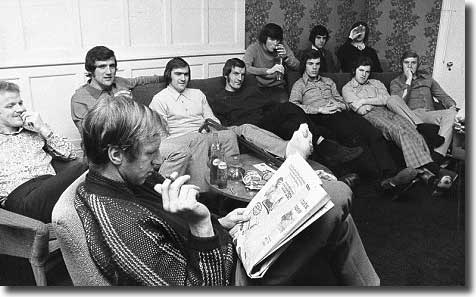 to
manoeuvre and none to provide for contingencies, such as bad weather,
replays and international demands.
to
manoeuvre and none to provide for contingencies, such as bad weather,
replays and international demands.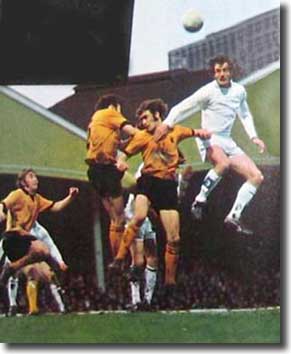 One
man sustained a broken leg and nine others required medical attention.
One
man sustained a broken leg and nine others required medical attention.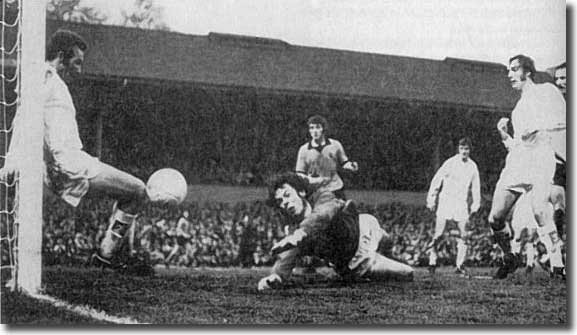 short
and Shaw's low diagonal cross was only sliced into greater danger by Giles'
attempted clearance. Munro's shot through a crowded area found the net
via a post despite Reaney's attempt to block. You could sense the collective
shudder in the Leeds ranks.
short
and Shaw's low diagonal cross was only sliced into greater danger by Giles'
attempted clearance. Munro's shot through a crowded area found the net
via a post despite Reaney's attempt to block. You could sense the collective
shudder in the Leeds ranks.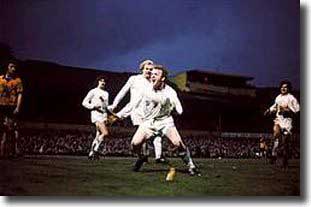 swept
great passing moves at each other. At one end a shot by Wagstaffe was
headed off the line by Madeley; at the other Bremner ended a long Hunter-Charlton
move with a beautiful slanting run from the right and a left foot shot
over the angle of the Wolves goal. In the dying minutes Taylor headed
out from under the bar... There it ended with Leeds again kept from the
prize they desire most of all. There have been few more tense matches
all season, played on a skidding, treacherous surface.
swept
great passing moves at each other. At one end a shot by Wagstaffe was
headed off the line by Madeley; at the other Bremner ended a long Hunter-Charlton
move with a beautiful slanting run from the right and a left foot shot
over the angle of the Wolves goal. In the dying minutes Taylor headed
out from under the bar... There it ended with Leeds again kept from the
prize they desire most of all. There have been few more tense matches
all season, played on a skidding, treacherous surface.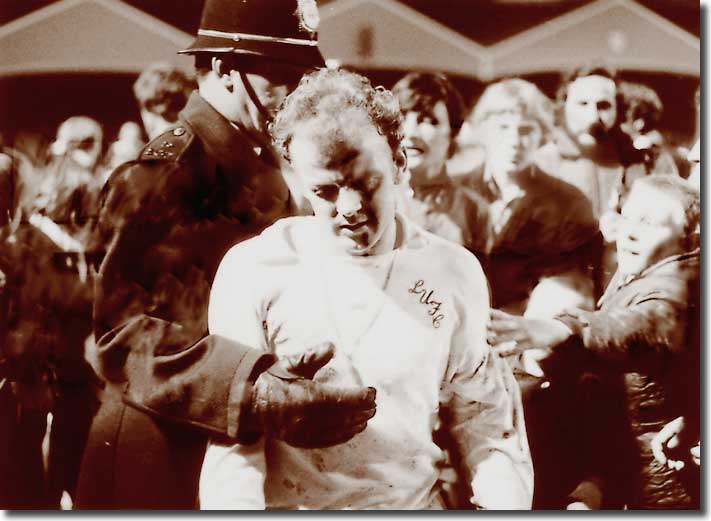 (fourth) were all on 57 in one of the most wide open championship races
for years.
(fourth) were all on 57 in one of the most wide open championship races
for years.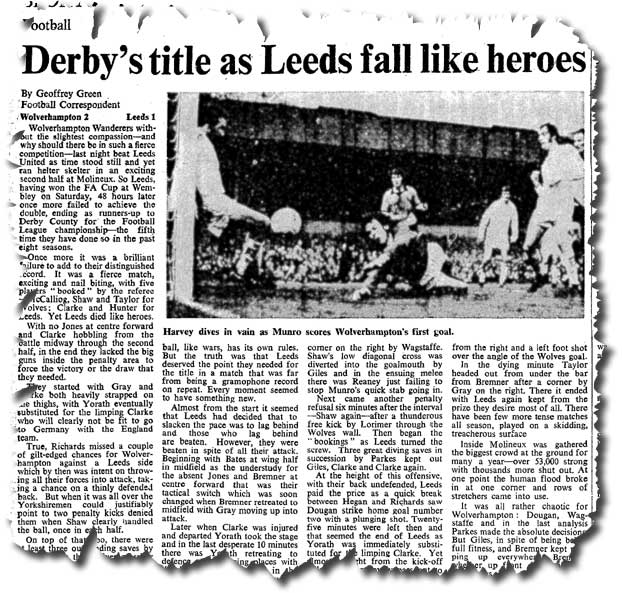 He
was met by Gary's solicitor, Bob Evans, who informed him that Gary had
already signed for the Daily Mirror. The Mirror, with information
gleaned from Gary and others within the game, alleged that Revie had tried
to fix important games on five separate occasions during his managerial
reign at Leeds. It was alleged that the games involved were earlier in
his Leeds reign while trying to avoid relegation and later when Leeds
were pursuing championship success. The revelations were earth shattering
in the world of football and the fallout was felt most severely in Leeds.
Most of the undeniably highly talented side took the side of their former
manager, repaying, perhaps blindly, the faith and loyalty he had shown
them over many years. Many of the players were infuriated by what they
read, and some to this day have never again read the Daily Mirror,
believing the revelations to be no more than a character assassination.
He
was met by Gary's solicitor, Bob Evans, who informed him that Gary had
already signed for the Daily Mirror. The Mirror, with information
gleaned from Gary and others within the game, alleged that Revie had tried
to fix important games on five separate occasions during his managerial
reign at Leeds. It was alleged that the games involved were earlier in
his Leeds reign while trying to avoid relegation and later when Leeds
were pursuing championship success. The revelations were earth shattering
in the world of football and the fallout was felt most severely in Leeds.
Most of the undeniably highly talented side took the side of their former
manager, repaying, perhaps blindly, the faith and loyalty he had shown
them over many years. Many of the players were infuriated by what they
read, and some to this day have never again read the Daily Mirror,
believing the revelations to be no more than a character assassination.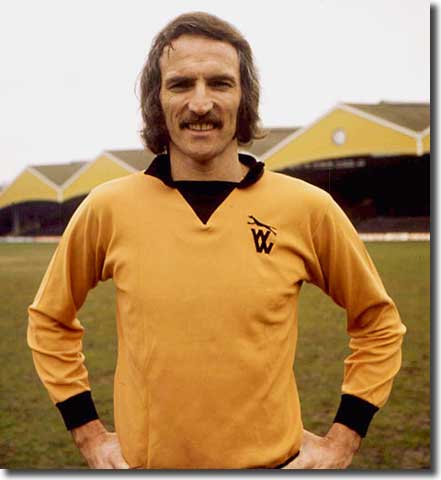 that he had offered bribes to fix a number of matches. Hegan told a reporter
and repeated in evidence that Bremner offered him £1,000 to give away
a penalty in the Wolves-Leeds game. Bremner denied that he had ever offered
a bribe to a player or attempted to fix a match.
that he had offered bribes to fix a number of matches. Hegan told a reporter
and repeated in evidence that Bremner offered him £1,000 to give away
a penalty in the Wolves-Leeds game. Bremner denied that he had ever offered
a bribe to a player or attempted to fix a match.
 something.
I was a pal of Franny … I said it as a joke. Wolves played out of their
skins that night … perhaps because of a bit of hatred of Leeds. They wouldn't
have played like that normally. But I don't know if an approach was made
that night, I'll be a hundred per cent honest.'
something.
I was a pal of Franny … I said it as a joke. Wolves played out of their
skins that night … perhaps because of a bit of hatred of Leeds. They wouldn't
have played like that normally. But I don't know if an approach was made
that night, I'll be a hundred per cent honest.'
